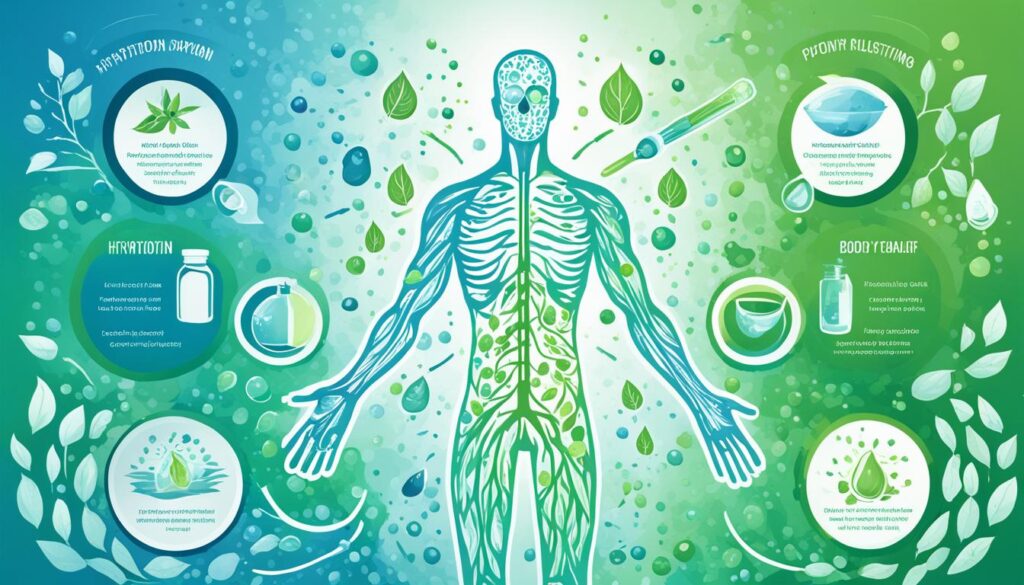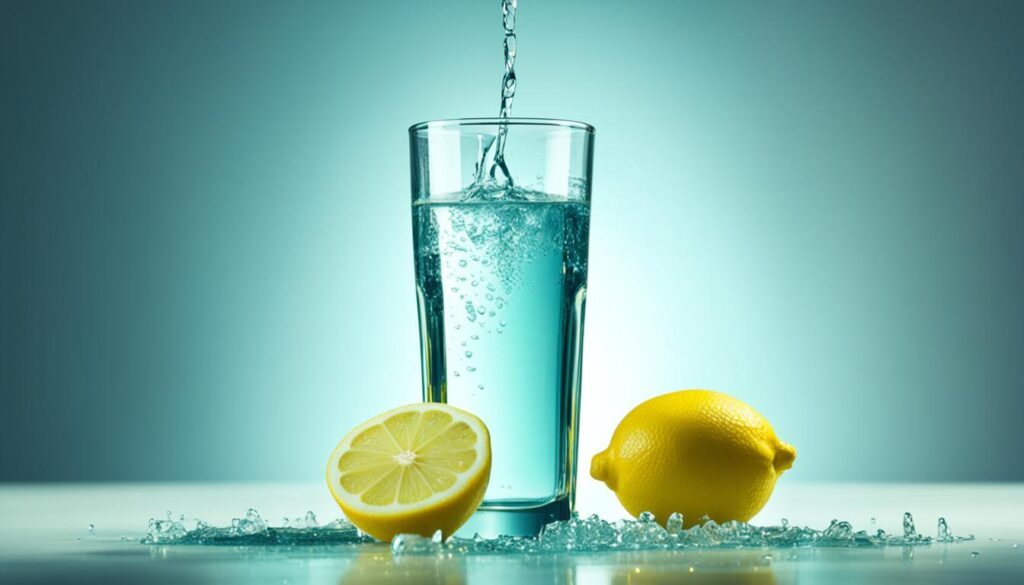Starting a health journey often means looking into hydration and fasting. These practices are key to a wellness routine that boosts the body’s detox systems. When we explore hydration and fasting, we see their big impact on health.
By using hydration and fasting, we let our body clean itself. This removes toxins that lower our energy and health.
Key Takeaways
- Hydration acts as a catalyst for the body’s natural waste removal mechanisms.
- Fasting gives the digestive system a rest, promoting enhanced detoxification processes.
- Understanding hydration and fasting can optimize the body’s purification ability.
- Effective detoxification support requires no special products, just a focus on these fundamental health practices.
- Combining hydration with fasting can serve as a simple yet powerful health strategy.
Understanding the Natural Detoxification Process
The importance of hydration and fasting is not only for weight control. It’s key for keeping the body’s natural detox system in top shape. When we look at the detox pathways, the link between organ health and detox is clear. Each organ has a crucial role, working together to remove toxins. This teamwork ensures our body’s cleaning processes run smoothly.
The Role of Organs in Detoxification
The liver works hard as the main detox player, filtering toxins. Meanwhile, the kidneys watch over our blood, removing waste. The digestive system, skin, and lungs also join in. They make up a strong network fighting off environmental and food toxins. By focusing on hydration and fasting, we use our body’s natural strength to boost health.
| Organ | Function in Detoxification | Supported By |
|---|---|---|
| Liver | Metabolizes toxins into harmless byproducts | Fasting periods that allow rest and recovery |
| Kidneys | Filter waste from blood; regulate water balance | Ample hydration for efficient waste excretion |
| Digestive System | Eliminates food waste and absorbs nutrients | Fiber-rich diet and adequate water intake |
| Skin | Expels toxins through sweat | Hydration for perspiration and skin elasticity |
| Lungs | Removes carbon dioxide from the bloodstream | Clean air and deep breathing exercises |
Common Myths About Detox Diets
In the world of detox diets, truth often gets mixed with myths. Many plans claim they can quickly remove toxins, but lack real proof. They suggest they have a special power to cleanse, yet can’t really help organ health and detox. Our bodies are complex and don’t fit a one-size-fits-all solution. Choosing simple actions like hydration and fasting helps protect us from pollution. This approach is grounded in science and promotes balanced, healthy living.
The Science Behind Hydration and Fasting
Exploring detoxification science, we see hydration and fasting as key. They push our body’s cleaning systems. Water is crucial for life, more than just quenching thirst. It helps control body temperature, keeps joints moving smoothly, and supports digestion. It also helps our bodies get rid of waste like urea and carbon dioxide.
In fasting for health, stopping eating boosts healing. Ancient wisdom and modern science agree on its benefits. Fasting gives the liver a break, enhancing its ability to clean our bodies. This pause in eating means the body can focus on getting rid of toxins.

Fasting and hydration should work together in our health routines. This balance might lead to better health levels. Science is still figuring things out, but it’s clear. The right mix of hydration and fasting can lead to big health improvements.
- Maintaining adequate fluid intake to reinforce the body’s waste expulsion routes.
- Adopting fasting periods to elevate liver functionality and toxin filtration efficiency.
- Appreciating the copious benefits interwoven in the fabric of these age-old practices, made robust by contemporary science.
Promoting Liver Health Through Hydration and Fasting Implementations
Keeping your liver healthy is key to detoxing your body. Your lifestyle choices are crucial in this effort. Focusing on staying hydrated and fasting helps keep your liver working right. This ensures it can clean your body of toxins.
We find that cutting back on drinking and fasting carefully are valuable. Both help maintain your liver’s health. They keep your liver’s detox abilities strong.
The Importance of Limiting Alcohol Intake
Cutting down on drinking helps fight liver damage. Alcohol makes your liver work hard to get rid of its poisons. Reducing alcohol helps your liver right away.
It avoids harmful substances and stops fat from building up. These actions can prevent liver diseases like steatosis or cirrhosis. By drinking less, you protect your liver and keep it working well.

How Fasting Can Support Liver Function
Fasting is a powerful way to support your liver’s health. It’s an old practice backed by modern science. Fasting gives your liver a break from processing food. This helps it remove toxins more effectively.
It also starts beneficial body processes. These include healing the liver and improving how it deals with fat. Fasting makes the liver stronger against damage.
- Reduces the liver’s exposure to dietary toxins
- Supports metabolic switching, enabling better fat utilization
- Triggers autophagy, eliminating damaged cells and promoting renewal
Choosing to stay hydrated and fast can make your liver stronger. This approach to detoxing doesn’t rely on drugs. Adding in less drinking and fasting times could help your body clean itself more fully.
In sum, taking care of your liver through these choices greatly helps. It boosts your body’s natural way of getting rid of toxins.
Impact of Quality Sleep on Detoxification
The health perks of good sleep go beyond feeling alert. It’s key for detoxification. While you rest, your body works hard to keep you healthy. This makes better sleep a major goal for those wanting to boost their natural cleanse abilities.
Sleep deeply links to detox, aiding in toxin removal. The brain cleans out waste at night, like beta-amyloid linked to Alzheimer’s. This is crucial for preventing disease.
Link Between Sleep and Toxin Removal
Studies show the brain’s glymphatic system kicks into high gear during sleep. It flushes out toxins, which the liver then removes. This shows how vital good sleep is for detoxing effectively.
Strategies for Improving Sleep Quality
To boost detox and enjoy better health, try changing your habits. Below are some strategies:
| Sleep Strategy | Benefits for Detoxification | Additional Health Benefits |
|---|---|---|
| Establish a consistent sleep schedule | Enhances regularity of the glymphatic system | Stabilizes mood and improves cognitive function |
| Reduce exposure to blue light at night | Promotes melatonin production for better sleep quality | Reduces risk of digital eye strain |
| Create a restful sleep environment | Minimizes disruptions during the body’s natural detoxification cycle | Aids in faster sleep onset |
| Limit caffeine and heavy meals before bed | Prevents sleep disturbances that can impede the detox process | Supports digestive health |
Using these tips can lead to better sleep and detox. Quality sleep isn’t just about feeling awake. It’s also about a strong detox system for good health.
Hydration and Fasting: What You Need to Know
When you start implementing fasting and hydration, it’s key to know the basics. Drinking enough water is essential for good health, especially during fasting. This helps your body cleanse properly.
| Hydration Tips | Fasting Tips |
|---|---|
| Drink at least 91 ounces of water daily for women and 125 ounces for men. | Begin with short fasting periods and gradually increase the duration. |
| Infuse water with fruits or herbs for added flavor and nutrients. | Eat a balanced meal prior to fasting to sustain energy levels. |
| Monitor hydration by checking the color of your urine. | Consult healthcare professionals before starting a fast, especially for those with medical conditions. |
Staying hydrated is more than just drinking water. It’s about making sure your detox systems work well. Tips for hydration and fasting suggest eating mindfully, exercising, and getting enough sleep. These actions help your body handle detox better.
Understand the needs of your body and recognize that hydration and fasting are personal experiences. Tailor your approach accordingly for the best health outcomes.
- Start and end your day with a glass of water to ensure continuous hydration.
- Experiment with different types of fasting such as intermittent, full-day, or time-restricted to find what best suits your lifestyle.
- Integrate nutrient-rich foods into your diet when not fasting to maximize the benefits of your detox.
- Stay cognizant of the signs of dehydration and hunger, and address them appropriately.
- Practice mindfulness to maintain focus and dedication to your hydration and fasting goals.
By adding these best practices for hydration and fasting into your life, you help your body detox better. Remember, following implementing fasting and hydration advice is key to making the most of your detox journey.
Reducing Sugar and Processed Foods for Optimal Detox
To live healthier, it’s key to cut down sugar for detox and limit health risks of processed foods. Doing this helps not just with keeping weight in check but also boosts the body’s detox powers. Processed foods bring hidden sugars, additives, and preservatives. These overload the liver and other detox organs, harming our health.
Dangers of Excessive Sugar on Organ Health
Taking in too much sugar hurts our organs, causing problems like non-alcoholic fatty liver disease and insulin resistance. It can lead to chronic inflammation, the root of many health issues. So, it’s crucial to eat less sugar for a balanced diet. This supports our body’s detox ability, keeping organs healthy.
Choosing Whole Foods Over Processed Alternatives
Choosing a detox through whole foods diet fights the bad impacts of processed foods. Whole foods are packed with nutrients, antioxidants, and fiber. These help detox the body. They keep the digestive system healthy, make the liver work better, and boost the immune system. Eating lots of fruits, vegetables, nuts, and seeds is a great way to clean the body and improve health.
The Power of Antioxidants in a Detox Diet
Adding natural antioxidants to your detox can greatly improve your health. It helps your body fight against pollutants from the environment and food. An antioxidant-rich detox diet fights off harmful free radicals. This protects you from oxidative stress. Keeping your cells healthy is key in maintaining your body’s detox systems.
Sources of Antioxidants and Their Benefits
Getting antioxidants from your diet is easy and beneficial. The earth gives us many foods full of nutrients that help fight free radicals. Berries are full of antioxidants, as are leafy greens, artichokes, and beans. Not only do these foods fight free radicals, they boost your immune system. They also help your body detox more effectively.
Antioxidants vs. Free Radicals in Detoxification
Antioxidants are like heroes in our bodies, fighting the free radicals. A diet filled with natural antioxidants in detox helps keep your body in balance. It also helps your body remove toxins smoothly. Including lots of colorful plant foods in your diet is essential. This way, you can boost your body’s detox processes and improve your overall vitality.




